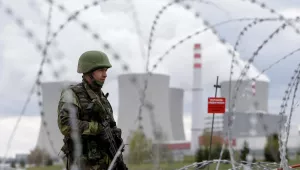America must better prepare itself for a terrorist attack involving biological weapons in retaliation for going to war against Iraq.
Despite claims that it has enough smallpox vaccine on hand for the entire U.S. population, the Bush administration has announced a limited program of vaccinations. It has decided to limit them to about a million military and selected health care workers in the first iteration, and then 10 million emergency workers in a second round.
Confronting "high confidence" intelligence findings that Saddam Hussein has smallpox that could be released in American cities in retaliation for U.S. attacks that might begin next month, the administration displays a caution about defending Americans at home that contrasts sharply with its readiness to attack adversaries abroad.
Debate about smallpox vaccination has focused on a damnable dilemma. Vaccination in advance of an attack would certainly cause several hundred deaths and thousands of serious illnesses. But waiting for an attack before initiating a crash vaccination program would court chaos in which thousands would likely die before receiving vaccine. Inescapably, we are damned if we do, damned if we don't.
Analyzing that choice, the Advisory Committee on Immunization Practices recommended against a broad vaccination campaign. But members of the panel were given no information about the threat of smallpox attack by Hussein or others. As a consequence, the public health debate has missed the urgent question that must be addressed now: Will Americans be adequately prepared to cope with the smallpox (or other biological) attack Saddam Hussein is likely to launch against us as events march toward war?
Note the contrast between the pace of the buildup for offensive action against Iraq and preparations to defend Americans at home. Over the past year, the Pentagon has constructed new bases in Oman and the United Arab Emirates; rebuilt the stock of smart weapons depleted in the war against Afghanistan; moved equipment, troops and now a headquarters to the region; and practiced tactics for a campaign that could include fighting in Baghdad.
In contrast, the Department of Health and Human Services has contracted for supplies of new smallpox vaccine that will, if they meet current schedules, be delivered in sufficient supply and licensed by the Food and Drug Administration for all Americans sometime in 2004. The chairman of the Senate intelligence committee, Bob Graham of Florida, has estimated the likelihood of an American-led war on Iraq in January or February at 70 percent. Imagine Hussein responds as the latest, recently declassified National Intelligence Estimate predicts he is "likely" to do with a biological attack on Americans. Who believes that the newly established Department of Homeland Security will be able to provide early identification of the virus, supply vaccines to hospitals and schools across the country or administer vaccines to 280 million Americans?
The public health debate has treated this issue as if we were preparing for a distant hypothetical. But the new information about Hussein's capabilities makes it clear that a period of maximum danger lies not years but months away. Should Hussein take a page from Tom Clancy's novel "Executive Orders" and dispatch operatives to a half-dozen American cities with perfume bottles filled with smallpox to spray in shopping centers, how bad could it be? Were this to happen early next year, the "Dark Winter" war game organized by some of the nation's leading think tanks last year offers clues about likely consequences. That scenario ended with 3 million Americans infected, 1 million of whom died.
How likely is such an attack? Obviously, no one knows. But American's best intelligence analysts offered their judgment on this question in the latest National Intelligence Estimate on Iraq. Only after a positive vote in Congress authorizing use of force against Iraq was ensured were the relevant portions of this estimate declassified. Its conclusion is chilling. In a classified Senate hearing on the estimate, Sen. Carl Levin (D-Mich.)pressed the question: "If we initiate an attack and he thought he was in extremis or otherwise, what's the likelihood in response to our attack that he would use chemical or biological weapons?" The senior intelligence analyst answered: "pretty high."
While some administration officials have disputed that judgment, Defense Secretary Donald Rumsfeld is not among them. When asked recently whether Hussein might respond to a U.S. attack with terrorist attacks on American targets, Rumsfeld responded: "I have no doubt if he's able, he would like to see that terrorist attacks occur in the event that military action was taken."
Sept. 11, 2001, shattered Americans' illusion of invulnerability -- or so we tell ourselves. Taking seriously our vulnerability at home to biological attacks by Hussein or al Qaeda should not counsel cowardice or inaction. It should, however, remind us of the wisdom of the Boy Scout motto: Be prepared. The urgent question about smallpox is: Are we prepared?
Absent an imminent threat of an attack by Hussein on us or our troops and allies in the region, President Bush should postpone a military attack until he can assure Americans the U.S. government is prepared to defend our homeland against smallpox or other bioterrorist counterattacks his intelligence analysts judge likely.
Allison, Graham. “Unprepared for Smallpox.” The Washington Post, December 26, 2002




